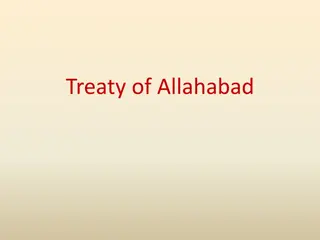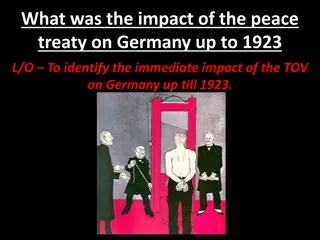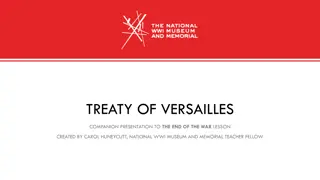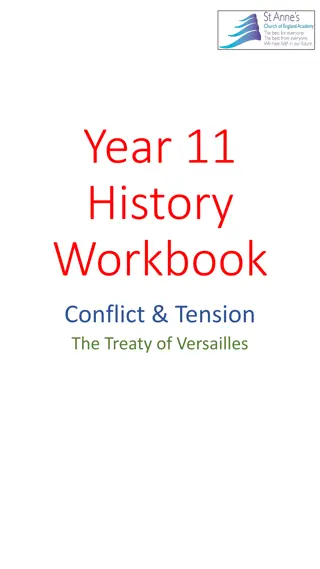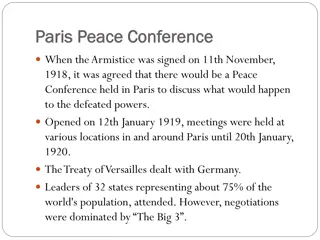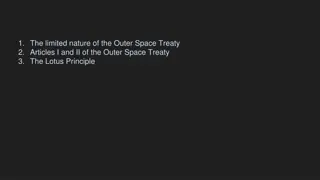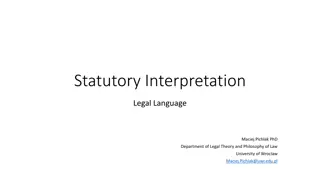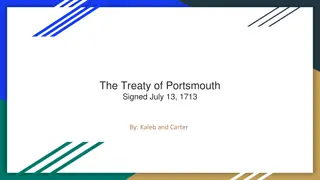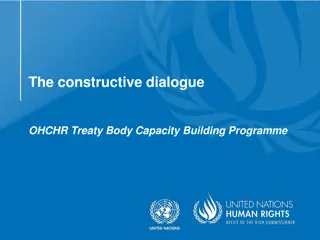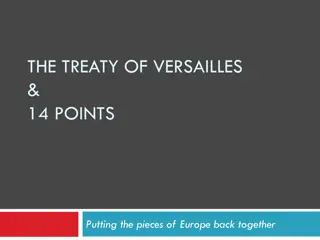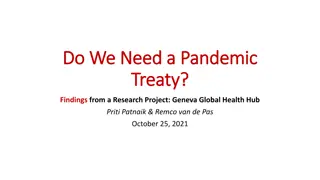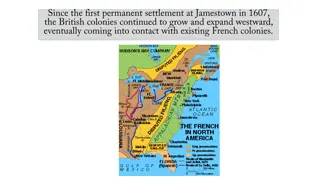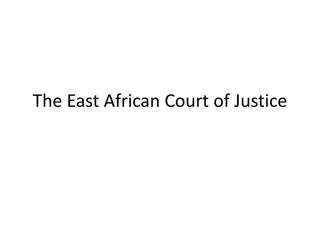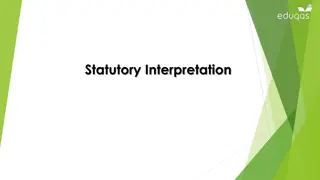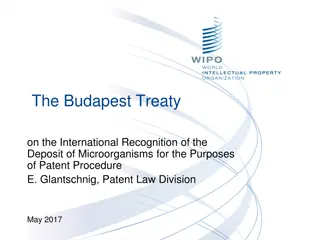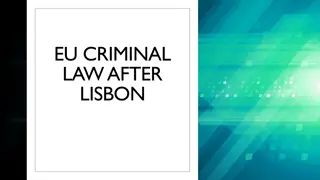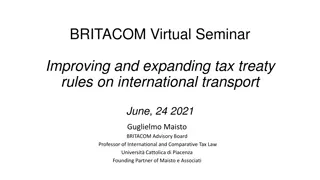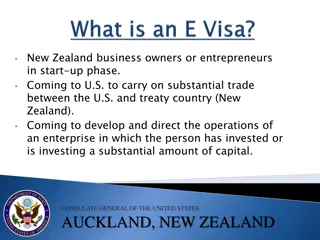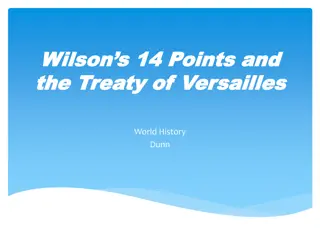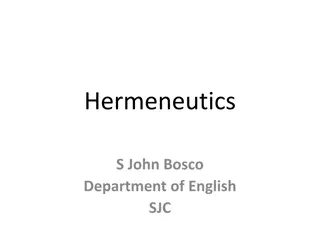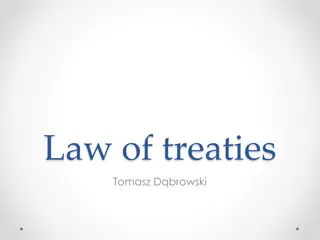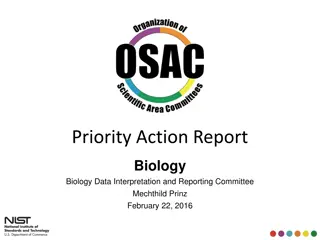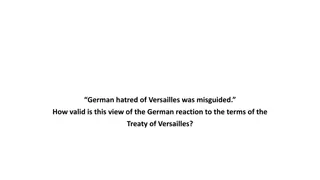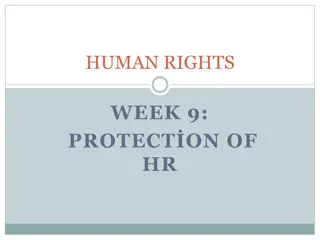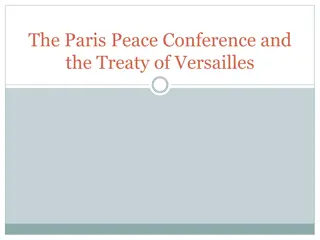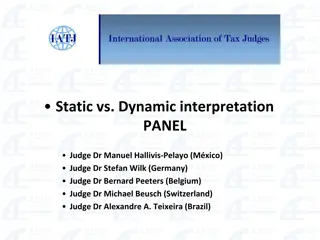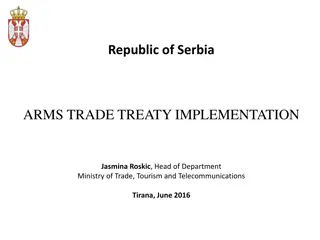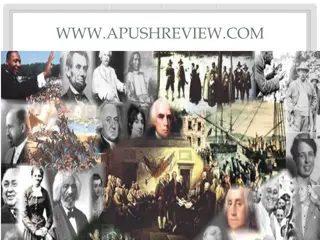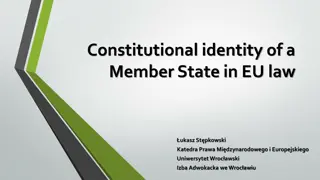OHCHR Working Paper
Working paper outlines options and guiding questions for developing an implementation plan for the conclusions of the human rights treaty body chairs. It provides a framework for strengthening the treaty body system and ensuring predictable reviews.
1 views • 13 slides
African Medicines Agency (AMA) Treaty Ratification Presentation to NCOP Select Committee
This presentation outlines the purpose, strategic importance, background, and value proposition of the African Medicines Agency (AMA) for South Africa. It highlights the urgent need for AMA in addressing Africa's health challenges and the process towards ratification of the treaty. Emphasizing the r
0 views • 32 slides
Treaty of Allahabad: Historical Agreement Between Shah Alam II and East India Company
The Treaty of Allahabad, signed in 1765, marked the beginning of British rule in India. Shah Alam II granted Diwani rights to the East India Company, allowing them to collect taxes in the eastern provinces. The agreement also involved territorial exchanges and financial obligations, altering the pol
1 views • 9 slides
Interpretation
Interpretation in research methodology involves drawing inferences from collected data, establishing continuity in research, and developing explanatory concepts for future studies. It helps researchers understand abstract principles, make predictions, and maintain research continuity. Interpretation
4 views • 5 slides
Impact of Treaty of Versailles on Germany up to 1923
Germany faced immediate harsh consequences from the Treaty of Versailles, including huge reparations, loss of resource-rich lands, and political turmoil. The treaty led to economic bankruptcy, hyperinflation, and social unrest, with right-wing extremists attempting coups and assassinations. The occu
1 views • 8 slides
Harmonisation of Substantive Criminal Law in the EU
The Treaty of Lisbon serves as a legal foundation for the harmonisation of substantive criminal law within the European Union. It establishes the basis for judicial cooperation, mutual recognition of judgments, and approximation of laws across Member States. The treaty allows for the establishment o
2 views • 60 slides
Treaty of Versailles Companion Presentation: Understanding the End of WWI
Explore the Treaty of Versailles and its significance through a companion presentation covering the Paris Peace Conference, major players like the Big 3, negotiation roles, and key terms. Learn about the attitudes of France, Great Britain, and the United States towards Germany post-WWI, the terms of
1 views • 14 slides
Understanding the Treaty of Versailles in Year 11 History Workbook
Exploring the aftermath of World War I, this Year 11 History workbook delves into the Treaty of Versailles, focusing on the aims of the Big Three leaders, the challenges they faced, and the terms imposed on Germany. Students engage in analyzing key points and disagreements, providing a comprehensive
1 views • 12 slides
Negotiations at the Paris Peace Conference: The Treaty of Versailles
The Paris Peace Conference of 1919 marked a significant event where the Treaty of Versailles was negotiated by the Big Three - Woodrow Wilson, Georges Clemenceau, and David Lloyd George. This treaty addressed key areas such as assigning guilt for the war, reducing armies, determining reparations, la
1 views • 19 slides
Understanding the Outer Space Treaty and the Lotus Principle
The Outer Space Treaty, comprising Articles I and II, establishes regulations on the exploration and use of outer space, emphasizing the benefit of all countries and free access to celestial bodies. The Lotus Principle, illustrated by the S.S. Lotus case, highlights that actions not explicitly banne
1 views • 4 slides
Understanding Statutory Interpretation in Legal Context
Explore the intricacies of statutory interpretation, linguistic and non-linguistic methods, and types of interpretation in legal contexts. Uncover the significance of legal reasoning, historical perspectives, and comparisons between Anglo-Saxon and Continental legal cultures. Delve into the complexi
1 views • 17 slides
First Nations Attack on Fort Michilimackinac 1763: Causes, Tribes, and Aftermath
The First Nations' attack on Fort Michilimackinac in 1763 was triggered by British actions that disrupted their way of life. The Ojibwe, Odawa, Potawatomi, Ottawas, and Hurons were involved in the attack, led by Chief Pontiac. Following the attack, the British did not rebuild the fort but establishe
1 views • 7 slides
The Treaty of Portsmouth: Agreement and Impact
The Treaty of Portsmouth, signed in 1713, was an agreement between the British and the Wabanaki Confederacy to establish peace and resolve land disputes. However, the treaty was soon broken, leading to conflicts and battles between the parties involved. The views of key figures involved in the treat
0 views • 9 slides
Understanding the Constructive Dialogue in Human Rights Context
The constructive dialogue is a key component of the OHCHR Treaty Body Capacity Building Programme, assisting treaty bodies in comprehensively assessing the human rights situation of a state party. This process involves various stakeholders, including state delegations and treaty body members, in str
1 views • 9 slides
The Impact of Treaty of Versailles and 14 Points on Europe Post-WWI
In the aftermath of World War I, the Treaty of Versailles and President Woodrow Wilson's 14 Points played pivotal roles in shaping Europe. The treaty aimed to restore peace by addressing the damages caused by the war, with key players like Wilson, George Clemenceau, David Lloyd George, and Vittorio
3 views • 19 slides
Automatic Recognition of Higher Education Qualifications Treaty Summary
Importance of automatic recognition of qualifications in higher education has been emphasized, leading to initiatives like the Treaty on Automatic Recognition of Higher Education Qualifications by Baltic and Benelux states. This treaty aims to enhance mutual trust, transparent recognition, and contr
1 views • 8 slides
The Need for a Global Pandemic Treaty: Research Findings
Research findings from a project by the Geneva Global Health Hub explore the necessity of a pandemic treaty in the context of socio-economic stresses, the securitization agenda, and political factors. The study examines alternative approaches to governing health emergencies, assesses the sufficiency
1 views • 12 slides
The Legacy of DAPL: Protecting Treaty Rights and Tribal Resources
Explore the background and lessons from the DAPL controversy, emphasizing the significance of tribal consultation, treaty rights, and the protection of sacred lands like Mni Sose. Gain insights into the challenges faced by indigenous communities and the ongoing efforts to uphold their rights and pre
2 views • 43 slides
The Albany Plan and Treaty of Paris - Historical Images and Effects of the War
Explore historical images related to The Albany Plan, Treaty of Paris, and the effects of the war on Britain and American colonials. Gain insights into European claims in North America before and after 1763.
0 views • 10 slides
Advanced Methods of Interpretation: Hermeneutics and Structuralism Lecture at Masaryk University
Understanding interpretation in cultural sociology through hermeneutics and structuralism is explored in Lecture III by Dr. Werner Binder at Masaryk University. The lecture delves into the art of interpretation, focusing on classical hermeneutics, Friedrich Schleiermacher's romantic hermeneutics, an
1 views • 37 slides
Overview of the East African Court of Justice
The East African Court of Justice is a judicial body established by the Treaty of the East African Community. It has jurisdiction over interpreting and applying the treaty, as well as handling legal challenges against acts of Partner States or Community institutions. Although not solely a human righ
0 views • 17 slides
Understanding Statutory Interpretation: Rules, Approaches, and Challenges
Explore the concept of statutory interpretation, including the intention of Parliament, problems that can arise, various rules and approaches used in interpretation, aids and presumptions, criticisms, and the relationship between statutory interpretation, EU law, and precedent. The Literal Rule, a c
2 views • 26 slides
Understanding the Budapest Treaty on Microorganism Deposits
The Budapest Treaty on the International Recognition of the Deposit of Microorganisms for the Purposes of Patent Procedure addresses the importance of sufficient disclosure and deposit of microorganisms in patent applications. Microorganisms play crucial roles in various industries like food product
0 views • 30 slides
Comprehensive Sensor Portfolio Analysis for Data Interpretation
This portfolio revision focuses on providing detailed descriptions and analysis of individual sensors for data collection and interpretation. It includes information on instrument specifications, data measurement setups, ancillary data, data processing steps, results interpretation, and cautionary n
0 views • 5 slides
Overview of EU Criminal Law Changes After Lisbon Treaty
The Lisbon Treaty signed in 2007 brought significant changes to EU criminal law, moving cooperation from the EU Treaty to the Treaty on the Functioning of the EU. It abolished the pillar structure, expanded the CJEU's competences in criminal law, and emphasized the area of freedom, security, and jus
0 views • 28 slides
The End of World War I and the Treaty of Versailles
The end of World War I marked by the collapse of Germany's allies, the signing of the Treaty of Versailles, and the formation of the League of Nations. The aftermath of the war led to significant political and social challenges in Europe, with the U.S. proposing the Fourteen Points for peace. Howeve
0 views • 5 slides
Enhancing International Tax Treaty Rules for Transport Sector
Explore the complexities of international tax treaty rules related to the transport sector, focusing on the challenges in applying tax treaties to various modes of transportation. Issues such as the scope of income coverage, domestic privileged tax regimes, and treaty relief formalities are discusse
0 views • 7 slides
U.S. E-2 Visa for New Zealand Business Owners and Entrepreneurs
New Zealand business owners and entrepreneurs in the start-up phase can benefit from the U.S. E-2 visa to carry out substantial trade between the U.S. and New Zealand. This visa allows qualified investors and employees to develop and direct operations in the U.S. without the need for a labor certifi
0 views • 10 slides
Versailles Treaty and Wilson's 14 Points in World History
Wilson's 14 Points aimed to prevent future wars by advocating for an end to secret agreements, self-determination for ethnic groups, and the establishment of a League of Nations. However, at the Treaty of Versailles, conflicting interests among world leaders led to a different outcome, with Germany
0 views • 14 slides
Understanding Hermeneutics: Exploring Interpretation and Meaning
Hermeneutics, a vital part of theology and philosophy, delves into understanding text and interpretation. Influenced by prominent thinkers like Heidegger and Ricoeur, it emphasizes the historical encounter and personal experience within the world. The concept of hermeneutical circle and the two area
0 views • 24 slides
Events Leading to WWII: Treaty of Versailles to Japan's Invasion of Manchuria
Events like the Treaty of Versailles, Great Inflation in Germany, the October 1929 Depression, and Japan's invasion of Manchuria were significant precursors to World War II. The flawed Treaty of Versailles, economic turmoil in Germany, global depression, and territorial ambitions of Japan all contri
0 views • 25 slides
Dispute Over the 1904 Border Treaty: Thailand vs. Cambodia
The dispute between Thailand and Cambodia over the 1904 border treaty involves conflicting claims regarding the location of the Preah Vihear Temple. While Thailand contends that Siam's actions are justified, Cambodia argues otherwise. The cases discussed touch on principles of treaty interpretation,
0 views • 13 slides
Forensic Biology Data Interpretation Committee Overview
The Biological Data Interpretation and Reporting Committee focuses on establishing best practices, guidelines, and standards for forensic DNA laboratory interpretation. Their goal is to ensure quality and consistency in the forensic community by standardizing scientifically valid methods of interpre
0 views • 26 slides
German Reaction to Treaty of Versailles: Misguided Hatred or Justified Resentment?
German resentment towards the Treaty of Versailles, seen by some as misguided, stemmed from divergent expectations, harsh territorial losses, and a perception of unfair treatment. While the treaty was not as severe as initially anticipated, it triggered a widespread sense of disillusionment and nati
0 views • 18 slides
Overview of Human Rights Monitoring Mechanisms
Human rights conventions under the United Nations and regional systems have established monitoring mechanisms to ensure compliance. These mechanisms include treaty-based and non-treaty-based approaches, with treaty bodies overseeing the implementation of legally binding instruments. Reporting proced
0 views • 23 slides
Influential Forces and Outcome of the Paris Peace Conference & Treaty of Versailles
Representatives of major nations convened at the Paris Peace Conference in 1919 to discuss the post-World War I peace process. The Big Four, comprising Great Britain, France, the United States, and Italy, had significant influences in shaping the Treaty of Versailles. The demands of the Big Four var
0 views • 7 slides
Static vs. Dynamic Interpretation Panel Discussion by International Judges
A panel discussion featuring judges from Mexico, Germany, Belgium, Switzerland, and Brazil on the topic of static vs. dynamic interpretation in legal cases. The discussion covers key issues, case studies, and outcomes. Legal sources like VCLT and OECD MC are referenced, emphasizing the importance of
0 views • 77 slides
Implementation of Arms Trade Treaty by Republic of Serbia
The Arms Trade Treaty (ATT) was ratified by the Republic of Serbia in October 2014 and entered into force on December 24, 2014. The treaty aims to establish international standards for regulating the international trade in conventional arms, covering activities such as exports, imports, transit, tra
0 views • 24 slides
Key Events in U.S. History: Alien and Sedition Acts, Jay's Treaty, XYZ Affair
Explore pivotal events in American history including the Jay's Treaty with Great Britain, Pinckney's Treaty with Spain, the XYZ Affair leading to the Quasi War, and the controversial Alien and Sedition Acts enacted by the Federalists to stifle opposition. Learn about the Virginia and Kentucky Resolu
0 views • 7 slides
Constitutional Identity in EU Law: Evolution and Interpretation
Exploring the concept of constitutional identity within EU law, this article delves into the evolution of this principle from the Treaty of Maastricht to the current Treaty structures. It highlights the notion of respecting national identities and essential state functions, emphasizing the importanc
0 views • 13 slides


